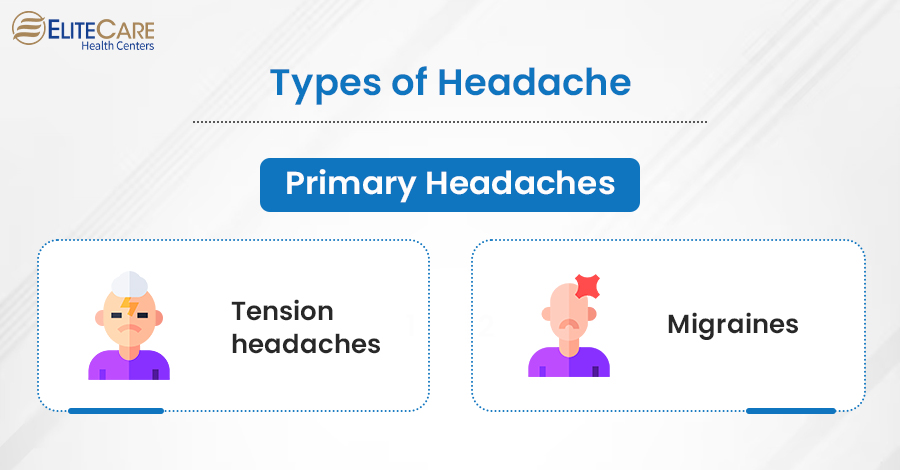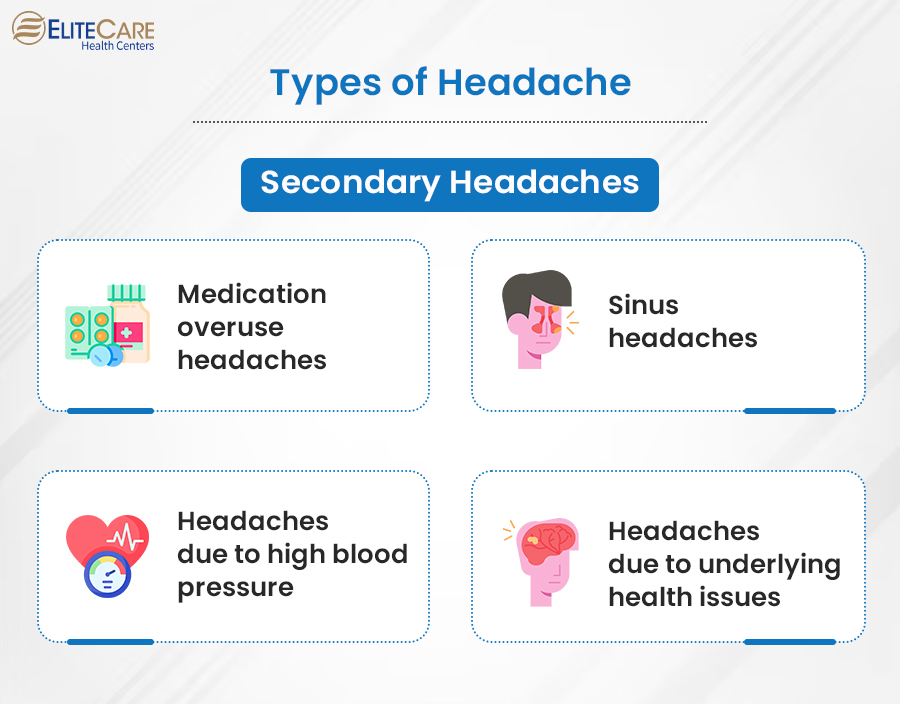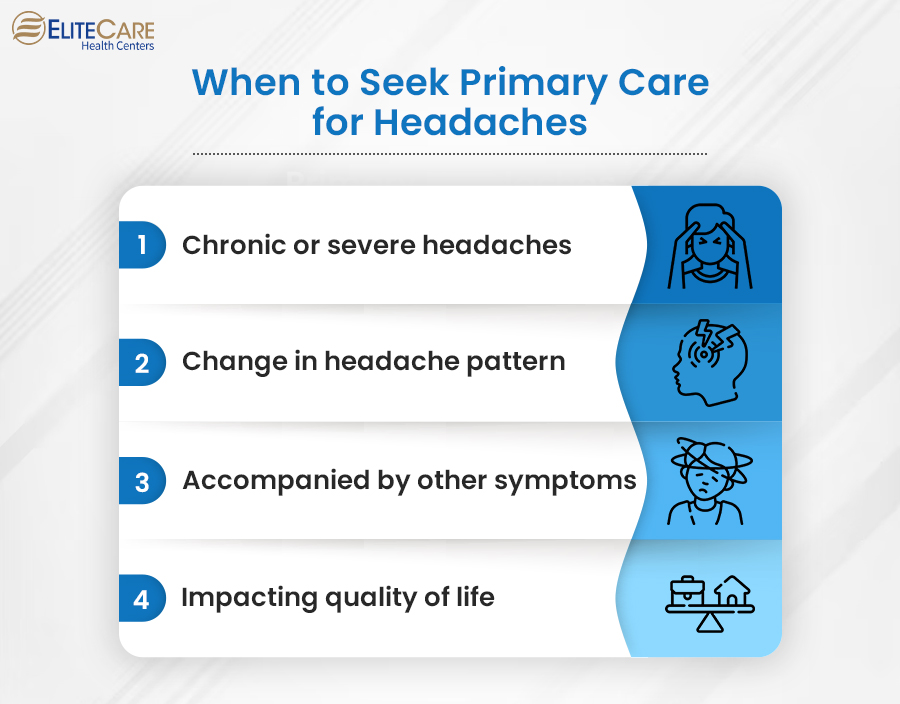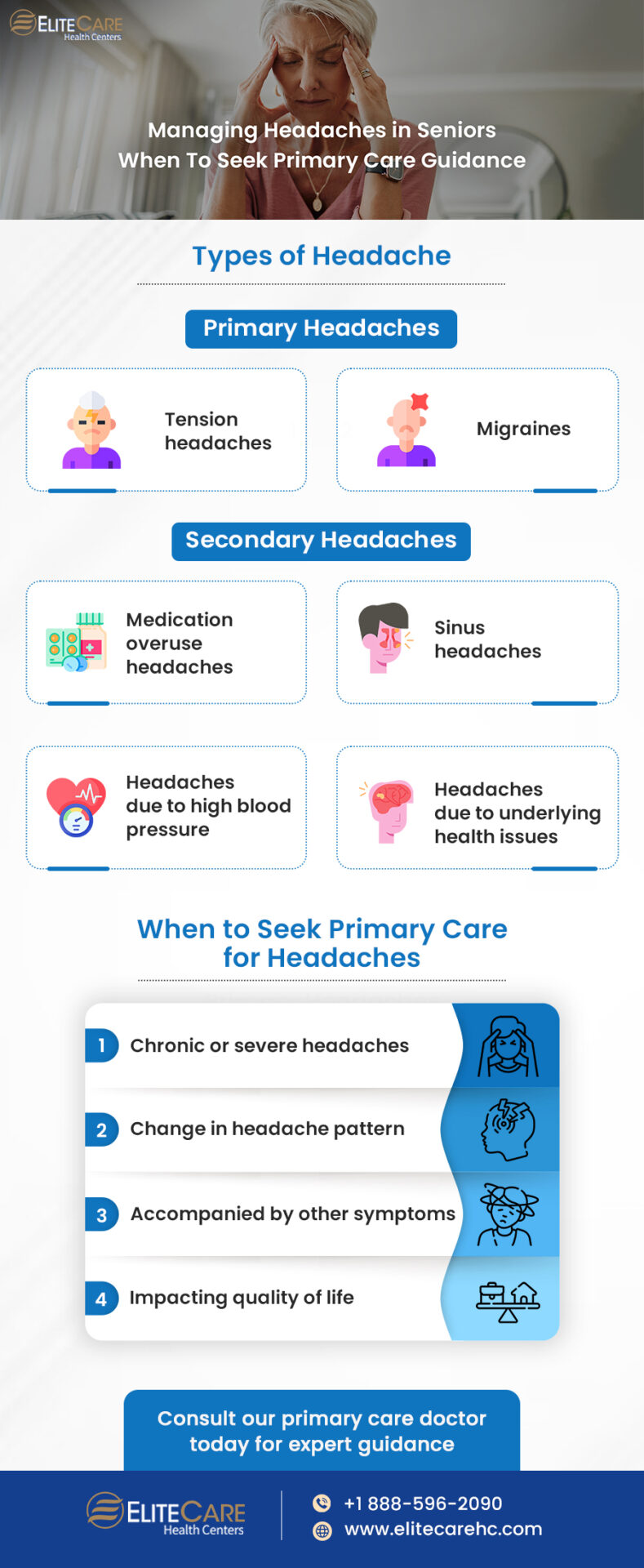
Headaches are a common complaint among people of all ages. Headaches in seniors can be concerning, as their health needs and requirements change with age, and seeking timely medical care is crucial.
Here we aim to provide comprehensive guide for headaches in seniors and when they should consult with their primary care physician for this problem.
Types and Causes of Headaches in Seniors
A. Primary headaches

1. Tension headaches: The most common type of primary headaches, Tension headaches, are often described as a dull, aching pain that wraps around the head, accompanied by muscle tension in the neck and shoulders. It can be triggered by stress, anxiety, poor posture, or lack of sleep.
2. Migraines: According to the National Institute of Health, migraine has a 10% prevalence in older adults annually and is the second most common headache disorder after tension headache in older adults. They are characterized by intense, throbbing pain, usually on one side of the head. Individuals experiencing migraines may also have additional symptoms such as nausea, sensitivity to light and sound, and visual disturbances. Certain foods, hormonal changes, stress, or environmental factors can trigger migraines.
B. Secondary headaches

1. Medication overuse headaches: Seniors who frequently use over-the-counter pain relievers may develop medication overuse headaches. These headaches occur as a result of the overuse or withdrawal from these medications. It is important for seniors to follow their senior care service providers’ instructions regarding pain medication usage.
2. Sinus headaches: These are caused by inflammation or infection in the sinus cavities. Individuals with chronic sinusitis or allergies may experience these types of headaches. Symptoms include pain and pressure in the forehead, cheekbones, or nose bridge. Treating the underlying sinus condition can alleviate sinus headaches.
3. Headaches related to high blood pressure or vascular issues: High blood pressure or underlying vascular conditions, such as arteriosclerosis or temporal arteritis, may cause headaches because of compromised blood flow to the brain. These headaches can be severe and require medical attention to manage the underlying vascular condition.
4. Headaches caused by underlying health conditions: Headaches can also be a symptom of other underlying health conditions, such as infections, tumors, or neurological disorders. These headaches can vary in severity and may be accompanied by additional symptoms that warrant further medical evaluation.
When to Seek Primary Care for Headaches

Experiencing occasional headaches is a common occurrence for many seniors. These headaches can usually be managed with self-care measures and over-the-counter pain relievers. By recognizing certain indicators, seniors can determine when it is necessary to consult a medical professional for headache relief-
1. Frequency and intensity of headaches
If seniors find themselves experiencing headaches more frequently, or if the intensity of the headache has increased, it may be a sign that medical attention is needed. Chronic or severe headaches can significantly impact the quality of life and require professional evaluation.
2. Changes in headache patterns
Seniors who notice significant changes in their headache patterns, such as new types of headaches, different locations of pain, or altered duration and timing, should consult physicians at health care clinics. These changes could indicate underlying health issues that need to be addressed.
3. Accompanied by other symptoms
When headaches are accompanied by additional symptoms, such as dizziness, confusion, visual disturbances, weakness, numbness, difficulty speaking, or fever, it is advisable to consult a primary care physician.
4. Impact on daily activities and quality of life
When headaches interfere with seniors’ ability to perform daily activities or participate in social interactions and negatively affect their overall quality of life, it is important to seek medical attention.
Visiting a medical clinic or having an online doctor consultation for headache relief and senior care services is advisable. Early intervention and proper management can help alleviate discomfort, improve overall health, and enhance the well-being of seniors.
The Role of Primary Care Doctors in Managing Headaches
Primary care doctors play a vital role in managing headaches for seniors, providing comprehensive care and guidance throughout the process. When seeking medical attention, primary care doctors offer the following:
A. Initial evaluation and diagnosis
During the initial visit, the primary care physician will conduct a thorough evaluation to determine the underlying cause of the headaches. This may involve reviewing the patient’s medical history, conducting a physical examination, and discussing the characteristics and patterns of the headaches. The physician will also inquire about any accompanying symptoms and assess the senior’s overall health.
B. Treatment options
- Lifestyle modifications: Doctors often recommend lifestyle modifications as a first-line approach to managing headaches. These may include stress reduction techniques, regular exercise, adequate sleep, maintaining a balanced diet, and avoiding triggers such as certain foods or environmental factors.
- Over-the-counter pain relievers: One may be suggested over-the-counter pain relievers for mild to moderate headaches. Primary care physicians will guide proper dosage and usage based on the seniors’ specific health conditions and their medications.
- Prescription medications: In cases where over-the-counter pain relievers are ineffective or the headaches are more severe, doctors at health care clinics may prescribe medications specifically designed to relieve headaches. These may include triptans for migraines, muscle relaxants for tension headaches, or preventive medications for chronic or recurrent headaches.
C. Referral to specialists if necessary
If an underlying condition is suspected or the headaches do not respond to initial treatments, physicians may refer the senior to a specialist such as a neurologist. These specialists have advanced expertise in diagnosing and treating complex headache disorders and can provide more specialized care and treatment options.
Additionally, primary care doctors may incorporate routine physical exams into managing seniors’ headaches by regularly monitoring their overall health and addressing any underlying medical conditions.
Red Flags: When to Seek Immediate Medical Attention
While most headaches in seniors are benign and can be managed with appropriate care, certain red flags indicate the need for immediate medical attention. Seniors should be aware of the following warning signs and seek prompt evaluation from a healthcare professional:
1. Sudden and severe headaches
If a senior experiences a sudden and severe headache, often described as the “worst headache of their life,” it could indicate a medical emergency. This could be a sign of a ruptured blood vessel in the brain (such as an aneurysm) or another serious condition that requires immediate medical intervention.
2. Headaches following head trauma
Any headache following a head injury, such as a fall or accident, should be taken seriously. It may indicate some traumatic brain injury, which requires immediate medical evaluation to rule out any serious complications.
3. Headaches with neurological symptoms
If the headache is accompanied by neurological symptoms, such as confusion, difficulty speaking, weakness in the limbs, or loss of coordination, it could be indicative of a more severe underlying condition.
4. Headaches with visual disturbances
Sudden changes in vision, such as blurred vision, double vision, or vision loss, may signify a serious condition. This could include conditions like acute angle-closure glaucoma or optic nerve problems, which require immediate medical evaluation.
It is crucial for seniors and their caregivers to be vigilant about these red-flag symptoms and seek immediate medical attention when they occur. When in doubt, it is always better to err on the side of caution and seek medical attention for severe or concerning headaches. Healthcare professionals at our healthcare center are trained to evaluate and provide the necessary care to address these potential red-flag symptoms.
The Bottom Line
EliteCare Health Center is a valuable resource for comprehensive senior care services. Our health center specializes in senior care and offers a range of services tailored to the unique needs of older adults. Annual and routine physical exams provided by such centers are essential for seniors to maintain optimal health and detect any underlying conditions that may contribute to headaches or any other chronic health issue.
Seniors should not hesitate to reach out to the primary care doctor or seek immediate medical attention if they experience concerning symptoms or red flags associated with headaches. Taking a proactive approach to healthcare and seeking timely medical care is crucial for maintaining optimal health and well-being in the senior years.






